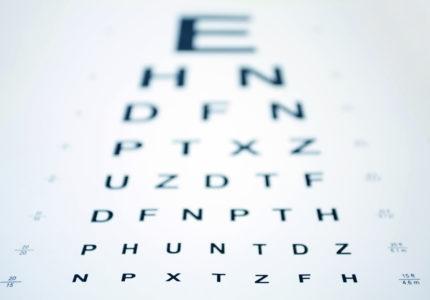While many patients feel that a vision screening may be enough, a study funded by the National Eye Institute found that even the most sophisticated vision screening tools, administered by the most highly trained vision screeners, will miss one-third of children with an eye or vision disorder. In patients that have no risk factors, we recommend that an infant have their first eye exam between 6-12 months. Subsequent exams should occur at least once between the ages of 3-5, before kindergarten, and annually thereafter until the patient turns 18. Following the age of 18, exams should be done every two years unless the patient wears glasses or contact lenses, or as recommended by their eye care professional.
 After the age of 65 annual exams are strongly recommended. Risk factors that may require more frequent examination in children include prematurity, family history of eye disease, eye turn or lazy eye (strabismus), family history of strong glasses prescriptions, academic performance problems, or the need for prescription medication that may affect eye health. Additional risk factors in adults also include belonging to certain racial or ethnic groups, occupations that are highly demanding visually, or have the potential to be hazardous to the eyes wearing, and contact lenses. Patients who have undergone refractive surgery, LASIK, PRK, RK should still have an eye exam every 1-2 years for monitoring eye health.
After the age of 65 annual exams are strongly recommended. Risk factors that may require more frequent examination in children include prematurity, family history of eye disease, eye turn or lazy eye (strabismus), family history of strong glasses prescriptions, academic performance problems, or the need for prescription medication that may affect eye health. Additional risk factors in adults also include belonging to certain racial or ethnic groups, occupations that are highly demanding visually, or have the potential to be hazardous to the eyes wearing, and contact lenses. Patients who have undergone refractive surgery, LASIK, PRK, RK should still have an eye exam every 1-2 years for monitoring eye health.

Eye exams in infants and children differ from adult eye exams in that we are unable to depend on subjective responses from the patient. First, a thorough history will be taken. Then the patient’s visual acuity will be ascertained by checking to see if the child can fixate and follow an object appropriately with each eye. We will also look for any eye muscle issues and to make sure the patient is using both eyes together. We will use lenses and light to check for large amounts of nearsightedness, farsightedness, and astigmatism. Low amounts of any of these refractive errors are very common and variable in infants and glasses are not needed for them. We will check eye health by looking at the structure of all the parts of the eyes. We will check the function of the pupils and prefer to check the health of the retina (back of the eye) by dilating the eye pupils with eye drops. Following the exam, a recommendation will be made as to when the next eye exam should occur. However, if you are ever concerned about anything going on, or notice a change in your child’s vision we recommend a prompt comprehensive eye exam because changes can occur quickly in a growing child. Our office staff is always happy to discuss any concerns you may have, or if you have a question as to whether you should bring your child in please call us.


